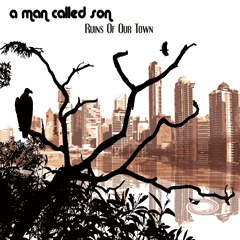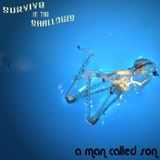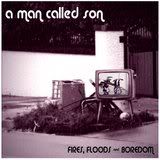
Writing about Michael Jackson's passing, I'm afraid I'm just adding to a million other rhinestone-studded obituaries. But that's to be expected when we lose someone of his stature. His appeal was so utterly universal that only the impact of The Beatles or Elvis Presley compare. You did not have to appreciate music to enjoy the music of Michael Jackson. You did not have to appreciate choreography or dancing to be awestruck by the jaw-dropping moves. You could be the most sullen kid in the universe with no interests except for dissecting cicadas and still be a fan. It takes a certain kind of genius to achieve that kind of crossover appeal.
I could quite easily focus on Michael Jackson: The Troubled Pop Star or Michael Jackson: Even Bigger In Death but I'm not going to do that. Outside the music my parents introduced me to, Michael Jackson was probably the first pop artist I seriously got into. When I was in primary school I had a friend where, as far as i can tell, the only thing we shared in common was that we both had our fair share of Michael Jackson albums on cassette. We would trade our tapes that covered the spectrum of Jackson's career at that point, from the Jackson Five through to Dangerous (which hadn't long been on the shelves) and dub copies for ourselves. We were precocious pre-Internet bootleggers with no business plan. I think we both secretly distrusted each other.
At that time, I was such a fan I even enjoyed the Moonwalker film, which is essentially a hodge-podge of the King of Pop crotch-grabbing his way through Bad-era material as the host of a futuristic TV special. The thing is, I'd probably still enjoy watching it now because the sheer scope of Michael Jackson's talent often transcended dross. Hence why he was able to get away with the monstrous statue-shipping ego-trip during promotion for History or the maudlin preach-fests of 'Heal the World' or 'Man In the Mirror'. It didn't matter what he did or whatever the latest controversy he was embroiled in, his blinding success and kinetic moves remained a constant source of fascination for me.
Yet at some point, perhaps when I was discovering acne and depressive English mid-80s vocalists, my interest in the King of Pop began to wane. The cassettes were replaced by newfangled CDs. The posters were torn off the wall (no pun intended) and replaced by Britpop idols. When Jarvis Cocker mooned Michael Jackson at the Brit awards for his predictably over-the-top performance of 'Earth Song' , it felt like the end of an era. I didn't know it at the time, but moving on from Michael Jackson signalled the end of my childhood. Yet the songs were still deeply engrained.
As soon as I hear 'I Want You Back' or 'Rock With You', I'm transported to being in Grade 5 class and I'm looking at the kid's desk next to me, realising he'd just created a dish-sized puddle of snot. Nothing to do with the subject matter of the songs, mind. When I hear 'Jam' or anything else off Dangerous, I remember my basketball obsession and am also reminded of sitting in front of the first tape player I ever owned and thinking "This is what hi-fi really means." Of course, I had nothing to compare the sound quality to, but I knew it sounded good.
Perhaps that's where the key to Jackson's success lies. There was simply nothing before him like him and unlikely to be anything since. Not having any other point of reference growing up, Michael Jackson seemed like the coolest human being on the plant. He seemed completely unshakeable. Yes, we all know the reality was different. Yes, the critics were quick to point out the irony of releasing an album called Invincible in 2001 at such a fragile, low point in his career (undoubtedly the irony was not lost on him or anyone else.) But there's something to be said about spending your childhood viewing your idols in a God-like aura. Don't know about you, but that's what true pop represents to me.
-AMCS
I could quite easily focus on Michael Jackson: The Troubled Pop Star or Michael Jackson: Even Bigger In Death but I'm not going to do that. Outside the music my parents introduced me to, Michael Jackson was probably the first pop artist I seriously got into. When I was in primary school I had a friend where, as far as i can tell, the only thing we shared in common was that we both had our fair share of Michael Jackson albums on cassette. We would trade our tapes that covered the spectrum of Jackson's career at that point, from the Jackson Five through to Dangerous (which hadn't long been on the shelves) and dub copies for ourselves. We were precocious pre-Internet bootleggers with no business plan. I think we both secretly distrusted each other.
At that time, I was such a fan I even enjoyed the Moonwalker film, which is essentially a hodge-podge of the King of Pop crotch-grabbing his way through Bad-era material as the host of a futuristic TV special. The thing is, I'd probably still enjoy watching it now because the sheer scope of Michael Jackson's talent often transcended dross. Hence why he was able to get away with the monstrous statue-shipping ego-trip during promotion for History or the maudlin preach-fests of 'Heal the World' or 'Man In the Mirror'. It didn't matter what he did or whatever the latest controversy he was embroiled in, his blinding success and kinetic moves remained a constant source of fascination for me.
Yet at some point, perhaps when I was discovering acne and depressive English mid-80s vocalists, my interest in the King of Pop began to wane. The cassettes were replaced by newfangled CDs. The posters were torn off the wall (no pun intended) and replaced by Britpop idols. When Jarvis Cocker mooned Michael Jackson at the Brit awards for his predictably over-the-top performance of 'Earth Song' , it felt like the end of an era. I didn't know it at the time, but moving on from Michael Jackson signalled the end of my childhood. Yet the songs were still deeply engrained.
As soon as I hear 'I Want You Back' or 'Rock With You', I'm transported to being in Grade 5 class and I'm looking at the kid's desk next to me, realising he'd just created a dish-sized puddle of snot. Nothing to do with the subject matter of the songs, mind. When I hear 'Jam' or anything else off Dangerous, I remember my basketball obsession and am also reminded of sitting in front of the first tape player I ever owned and thinking "This is what hi-fi really means." Of course, I had nothing to compare the sound quality to, but I knew it sounded good.
Perhaps that's where the key to Jackson's success lies. There was simply nothing before him like him and unlikely to be anything since. Not having any other point of reference growing up, Michael Jackson seemed like the coolest human being on the plant. He seemed completely unshakeable. Yes, we all know the reality was different. Yes, the critics were quick to point out the irony of releasing an album called Invincible in 2001 at such a fragile, low point in his career (undoubtedly the irony was not lost on him or anyone else.) But there's something to be said about spending your childhood viewing your idols in a God-like aura. Don't know about you, but that's what true pop represents to me.
-AMCS




 Survive in the Shallows (2008)
Survive in the Shallows (2008)
 Fires, Floods and Boredom (2006)
Fires, Floods and Boredom (2006)
